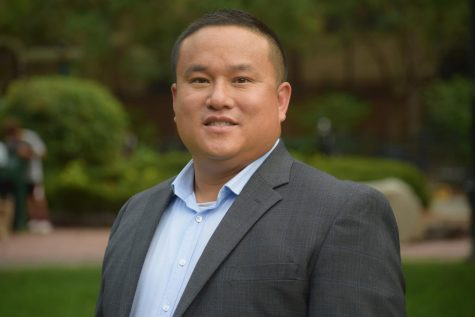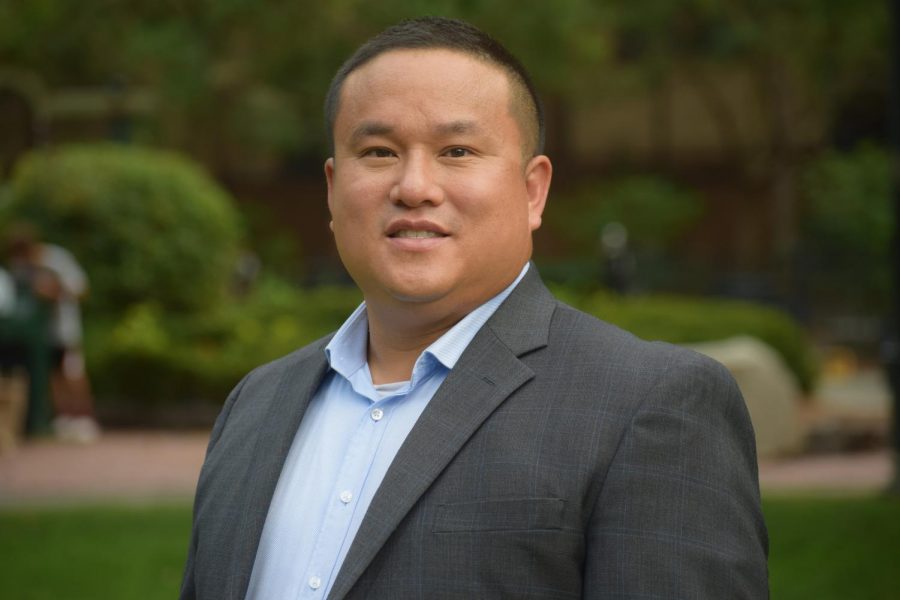Photo Courtesy of Christopher Lim
Christopher Lim
Register Forum: Alright. So, what do you think distinguishes you from the other ten candidates?
Christopher Lim: My engineering background, my focus on large systems, for both organizations and both in the public and private sectors, and I think it is a factor that I’m married to a teacher. Somebody who’s been teaching in public schools for over 20 years.
RF: Great. How do you think the School Committee could become more effective, just like in general?
CL: Short or long term?
RF: Both.
CL: Long term I think it’s a structural issue. When you have elections [every two years], you’re not particularly motivated to work with your peers, because your peers are your competitors. So you’re trying to get, you have a very short window if you’re trying to get elected where you also have to be able to answer these questions about what sets you apart, and if you cooperate too well with your peers now you’ve hurt yourself in a way. So long term I think it might be worth investigating either longer terms or changing up something about the election cycles so that you encourage cooperation rather than competitor relationships. Short term, I think you have to have people that can work together. You have to be able to able to find these people that aren’t necessarily worried about getting reelected so that you actually push forward meaningful policies.
RF: Yeah okay. How are you aiming to close the achievement gap?
CL: Wow. Okay. No holds barred. I think that you have to focus on what you’re actually trying to accomplish if you’re trying to set policy, so if your goal is to close achievement gaps you have to provide additional resources, whether it be time, money, tutoring to the population that you’re trying to boost up, and the challenge is can you do that without harming the rest of the population. Can you do that without depriving them of opportunity? And so I think you have to be targeted with what you’re trying to do and you have to focus those efforts on the groups that are the most in need.
RF: And on your website, you say that you want to work on closing the achievement gap without sacrificing advanced learning. How do you plan on doing that without implementing a form of tracking in schools?
CL: So, I think the evil with tracking is when you don’t allow people to get out of tracks. Right, like, I don’t think people have, I am a product of what they used to call leveled education. I don’t have the strong bias against it necessarily, but I understand the frustration when if you just bin people early and you know if there’s never any change then that’s a problem too. I think that what you guys are doing over at CRLS, what the principle is trying to accomplish with mixed levels is great, as long as you manage class sizes. Right, I have the utmost faith and confidence in your teachers, and I think that the students can achieve in mixed-level classes, but then we have to make a serious effort to manage those class sizes. It’s one thing to do that for a classroom of fourteen or 16, but it’s a pretty different thing to do that for 22 or 25.

RF: So, another thing on your website said that you want to promote community and reach out to former CPS graduates. Because of the increasingly expensive Cambridge housing, a lot of CPS graduates are moving away immediately after graduating. How do you plan on doing that with distance as an obstacle?
CL: Well, my program at MIT was collected program, so there are certainly ways to solve the distance in terms of just keeping communication channels open. One of the things that you’re pointing out is absolutely true about our society. Right? Like how do we stay in touch with people that are at great distances? And I think that it’s never going to be as good as face to face communication, but I think that they need to feel welcome always. And so whether it’s conference calls or skype, or google chats or whatever, being able to reach out and contact some part of the CPS system as a graduate wherever you are located is possible and I think there would be valuable feedback for reaching out to them. The other thing that I talk about on the website and the answer to the is creating opportunities for graduates to come back and intern and work and be mentors and that’s going to be a long term process. Like you have to create these opportunities at local companies and incentivize them to prioritize Cambridge residents and the ability to come back to Cambridge.
RF: In relation to that, how do you plan to form a community with teachers that can’t afford to live in Cambridge anymore?
CL: I…well that’s a huge issue. One of the things the mayor has been working on is affordable housing. I think we need to prioritize teachers in that affordable housing cue. Right, one of the challenges me and my wife went through this as well … We have a number of friends that teach in Cambridge Public Schools, you start out as a young teacher, you get your first couple of jobs, you work and then as you get older and you have a family you want more space you move out if you don’t create those opportunities and tie civic service back into affordable housing, you’re going to lose those families to other areas.
RF: What do you see as a strength of the CPS and what do you see as a weakness that you think you can help improve?
I think our two greatest strengths are our students, because the student body is incredibly diverse and tremendously high potential, I think the teachers are amazing, and our interactions K-6, we love the faculty, we love the staff, my son has been through some of the special ed services and people here are phenomenal. And it’s about making more efficient choices and being more effective with our resources because we do spend and you know we have the tremendous potential in the system, but we need to be more a little more efficient about how we do things to get the best out of it. The weakness? It is in a lot of ways we are not yet truly having courageous conversations. I think it’s pretty clear that we have some racial issues in this area, and I think that’s reflective of the country, and we are right now in a time that is pretty horrific in the reappearance of sort of outright casual racism, and I think that part of what we can do as living in a progressive bubble as we do, have those forthright and honest conversations. How do we challenge racism, how do we do what needs to happen from a moral and an ethical standpoint, but also maintain a functional classroom? Maintain the civility that is and should be part of the system.
RF: So in relation to those conversations, how do you think you can incorporate those conversations into the Committee?
CL: That’s within the Committee itself, I think you have to be humble, you have to be completely honest, and you have to be willing to step back from what you are trying to accomplish and listen to others. We have a lot of well-meaning, positive intentioned people that sometimes get a little carried away with what’s going on and I think you have to be humble enough to go out and seek people that are in different communities than your own and get their feedback before you start sort of pushing policy out there.
